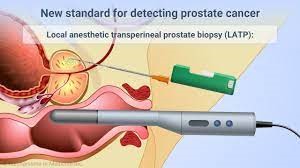If you’ve been experiencing symptoms such as difficulty urinating or pain during urination, your doctor may perform some tests, including a digital rectal examination, PSA blood test and MRI scan. If these tests show a possible abnormality, your urologist may recommend a prostate biopsy to check for prostate cancer. Here’s what you need to know about this procedure, including what it is, how it’s performed, and what to expect.
What is a Prostate Biopsy?
A prostate biopsy is a medical procedure that involves removing small samples of tissue from the prostate gland for laboratory analysis. The procedure is typically performed to check for signs of prostate cancer, although it may also be used to diagnose other conditions such as an enlarged prostate or prostatitis.
How is a Prostate Biopsy Performed?
During the procedure, a thin, hollow needle is inserted into the prostate gland through the rectum (Transrectal Ultrasound biopsy – TRUS) or the perineum (the area between the scrotum and anus – Transperineal biopsy). The needle is guided by an ultrasound or MRI image to ensure that the tissue samples are taken from the correct area of the prostate gland.
The procedure is typically performed on an outpatient basis under local anaesthesia. It may take up to 30 minutes to complete, and you will be able to go home the same day.

What to Expect After a Prostate Biopsy?
After the procedure, you may experience some discomfort or pain in the prostate area and blood in the urine or semen. These symptoms should subside within a few days. It is important to avoid strenuous activity, heavy lifting, or sexual activity for a week after the procedure to allow your body to heal.
Your surgeon will typically receive the biopsy results within a few days to a week and will discuss the results with you at a follow-up appointment. If the biopsy reveals cancer, your urologist will work with you to develop a treatment plan tailored to your needs.
What are the risks of a Prostate Biopsy?
While it can be an effective diagnostic tool, men should be aware of potential risks associated with the procedure.
One of the most common risks of a prostate biopsy is infection. Because the biopsy involves inserting a needle into the prostate gland, there is a risk that bacteria from the rectum or elsewhere in the body could be introduced into the gland, causing an infection. This is much more common with the transrectal biopsy procedure than the transperineal biopsy. Symptoms of an infection may include fever, chills, pain or discomfort, and difficulty urinating. In some cases, antibiotics may be needed to treat the infection.
Another potential risk of a prostate biopsy is bleeding. Because the biopsy involves removing a small sample of tissue from the prostate gland, there is a risk of bleeding. This may cause blood to appear in the urine or semen, or men may experience rectal bleeding. While bleeding is usually mild and resolves on its own, in some cases, additional medical attention may be required to stop the bleeding.
In rare cases, a prostate biopsy can also lead to more serious complications, such as difficulty urinating or erectile dysfunction. This may be due to damage to the nerves or muscles around the prostate gland during the biopsy procedure.
It’s important for men to discuss the risks and benefits of a prostate biopsy with their healthcare provider before undergoing the procedure. Men who are at increased risk of complications may need to take special precautions or may need to undergo alternative diagnostic tests.
Conclusion:
A prostate biopsy is a relatively simple procedure that can provide valuable information about the health of your prostate gland. While it can be uncomfortable, the procedure is generally well-tolerated and carries a low risk of complications. If you are experiencing symptoms of prostate problems, talk to your doctor about whether a prostate biopsy may be right for you. With early detection and treatment, prostate cancer can often be successfully managed.
Author: Mr Neil A Haldar MBBS MD FRCS
Consultant Urological Surgeon
The Pelvic Specialists
